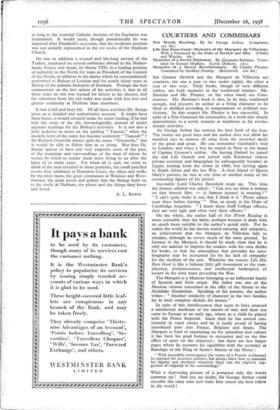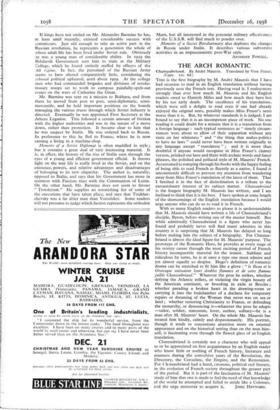COURTIERS AND COMMISSARS
Life Has Been Good: Memoirs of the Marques de Villavieja. With a Foreword by the Duke of Berwick and Alba. (C.hatto . and Windus. r8s.) Memoirs of a Soviet Diplomat. By Alexandre Barmine. Trans- lated by Gerard Hopkins. (Lovat Dickson. 15s.) Memoirs of a Secret Revolutionary. By Charles Plisnier. Translated by Geoffrey Dunlop. (Boriswood. xos. 6d.)
SIR GEORGE ARTHUR and the Marques de Villavieja are ; courtiers, the one a year or two under eighty, the other a
year or two over. Their books, though of very different calibre, are both memoirs in the traditional manner. Mr.
Barrnine and Mr. Plisnier, on the other hand, are Com- munists. Mr. Barmine's book is also, in its way, traditional enough, and presents its author as a living character to be liked or disliked according to temperament or political con- victions. In this respect Mr. Plisnier is less successful. In spite of a Prix Goncourt his personality, in a work that closely approximate to a novel, remains as tenebrous as his revolu- tionary activities.
Sir George Arthur has written the best book of the four. The stories are good ones and the author does not allow his - manifest tact to remove all sting from the recorded deeds of the good and great. He can remember Garibaldi's visit to London, and when a boy he stayed in Paris at the house of Captain Gronow's widow. On leaving Oxford he joined the and Life Guards and served with Kitchener (whose private secretary and biographer he subsequently became) in Egypt, retiring from the Army in 1886, but serving again in South Africa and the last War. A close friend of Queen Mary's parents, he met at one time or another many of the outstanding figures of his period.
Inevitably Lord Charles "Beresford crops up. This time the famous admiral was asked : "Can you see what is written
on that brooch -Mrs. -- (a famous actress) is wearing ? " "I can't quite make it out, but I think it is 'Please adjust your dress before leaving.'" Nor, as usual, is the Duke of Cambridge forgotten. "I know these Staff College officers, they are very ugly and often very dirty officers."
On the whole, the earlier half of Not Worth Reading is more enjoyable than the latter, perhaps- because it deals with an epoch more suitable to the author's genial style. For he
makes the world he has known sound amusing and attractive, an arhievement that the Marques de Villavieja fails to emulate, although he covers much of the same ground. In
fairness to the Marques it should be made clear that he is only too anxious to impress his readers with his own dislike for books, so that the atmosphere that pervades his auto- biography may be accounted for by his lack of sympathy for the medium of the pen. Whatever the reason, Life Has Been Good is like a hideous little gilt monument to the com- placency, pretentiousness, and intellectual bankruptcy of society in the sixty years preceding the War.
The Marques is a Mexican belonging to an influential fatuity of Spanish and Irish origin. His father was one of the Mexican citi7ens concerned in the offer of the throne to the Archduke Maximilian. Speaking of his parents, the author writes : "Another similarity of, character in the two families lay in their complete disdain for money."
In spite of this fastidiousness they seem to have amassed a satisfactory modicum of the sinews of war, and their son came to Europe at an early age, where as a child he played with the Prince ImperiaL Since then he has moved con- sistently in court circles and he is justly proud of having introduced polo into France, Belgium. and Spain. The Marques is fond of expatiating on the splendour and culture it has been his good fortune to encounter and on the fine effect of sport on the character; but there are less happy pages where he recounts his squabbles with the secretary at Ranelagh or the King of Spain's Master of the Horse: "With incredible extravagance [he writes of a French nobleman] he pursued his aventures galantes, but always knew how to maintain • his dignity and aloofness whenever there was the slightest sug- gestion of vulgarity in his surroundings."
What a depressing picture ...of a._pompous rake the words summon up ! And yet, no doubt, Sir George Arthur could describe the_ same man and make him sound -the best fellow in the world I
If kings have not smiled on Mr. Alexandre Barmine he has, at least until recently, enjoyed considerable success with commissars. Just old enough to take an active part in the Russian revolution, he represents a generation the whole of whose adult life has been lived under Soviet rule. Obviously he was a young man of considerable ability. In 1919 the Bolshevik Government sent him to train at the Military College, which he found entirely staffed by officers of the 0Id r:gime. In fact, the personnel of the Russian Army seems to have altered comparatively little, considering the colossal political upheaval, until about 1929. At the college men who had commanded brigades and divisions of revolu- tionary troops set to work to compose painfully-spelt-out essays on the wars of Catherine the Great.
Mr. Barmine was sent on a mission to Bokhara, and from there he moved from post to post, semi-diplomatic, semi- mercantile, and he held important positions on the boards managing the various trusts through which Soviet industry is directed. Eventually he was appointed First Secretary at the Athens Legation. This followed a certain amount of friction with the higher authorities and was in the nature of a move down, rather than promotion. It became clear to him that he was suspect by Stalin. He was ordered back to Russia. In preference to this he fled to France, where he is now earning a living in a machine-shop.
Memoirs of a Soviet Diplomat is often muddled in style ; but it contains a great deal of very _interesting material. It • is, in effect, the history of the rise of Stalin seen through the eyes of a young and efficient government official. It throws light on the way life is really lived in the Soviet, and on the existence, powers, and relative advantages and disadvantages of belonging to its new oligarchy. The author is, naturally, opposed to Stalin, and says that his Government has more in common with Fascism than with the Communism of Lenin. On the other hand, Mr. Barmine does not seem to favour "Trotskyism." He supplies an astonishing list of some of the executions that have taken place, and says that Toukhat- chevsky was a far abler man than Voroshilov. Some readers will not presume to judge which faction represents the orthodox
-Marx, but all interested in the potential military effectiveness of the 'U.S.S.R. will find much to ponder over.
Memoirs of a Secret Revolutionary also deplores the changes in Russia under Stalin. It describes various subversive activities in an impressionistic post-War style.
ANTHONY POWELL.















































 Previous page
Previous page